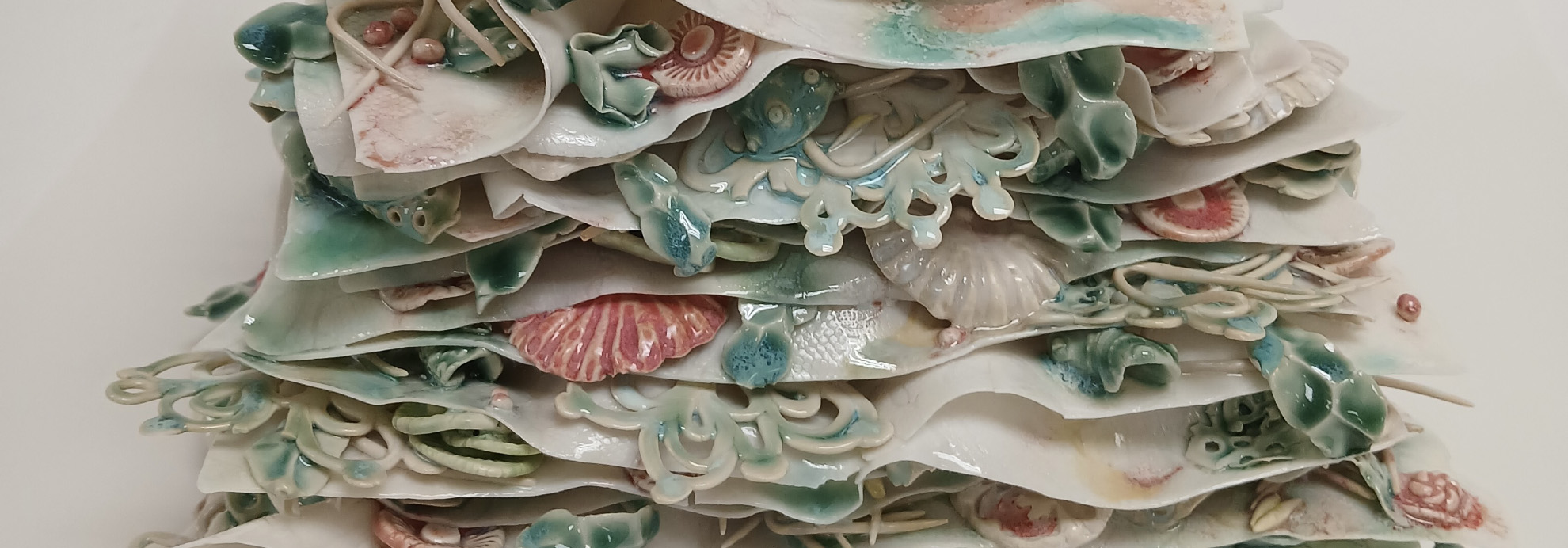We may be made of star stuff, according to Carl Sagan, but the way Jessica Kreutter sees it we are all made of dirt.
Kreutter’s sculptures—though she prefers to call them ceramic assemblages—literally take pieces of the earth (clay) and sometimes found objects to echo the natural cycle of decay and renewal. But for “Collapse,” her latest exhibition now running at the Galveston Arts Center through Feb. 16, 2025, Kreutter is revisiting, reviving, and reforming some of her earlier works into entirely new creations.
“Ceramics is, inherently, a lapse of control,” she says. “There’s always an unknown when you put it in the kiln. You know things will fall, but you won’t know how. It’s about seeing if transformation is possible.”
In 2016, Kreutter made a bed out of 80 individual, translucent sheets of porcelain, thin enough for light to shine through. Now she’s re-glazed and re-fired the sheets into eight stacks of “fabric” interspersed with her signature pink, blue, and green “debris.” Another work takes two to three large, half-sphere forms and fills them with rubble made of elements from past pieces. A third hangs “fungi shelves” on the wall, reminiscent of mushroom clusters naturally stair-stepping up a tree trunk.
The fourth gathers 22 open-vessel “hearts,” each with cracks and holes that reveal various shades of red glaze hiding inside. All are linked by a gold line. “Think of them as imperfect, broken hearts tied together,” Kreutter says. “Perhaps instead of rebuilding and repairing, there is the chance to transform. New gaps make room for variation and change. Loss and destruction become a pathway to somewhere new.”
Next door to the gallery, atop a bed of dirt in the GAC’s Vault, lies a work Kreutter made in 2023: Everywhere I am, a part of everything is a part of me. Colorful, mushroom-like ceramic spores sprout from delicately pale porcelain legs, hands, and feet, as if the earth is rising up to reclaim a full human body left to rot.

1 ⁄5
Jessica Kreutter
Everywhere I am a part of everything is a part of me, 2023
Porcelain, glaze, luster, dirt
2’ x 4’ x 6’
Photo courtesy of the artist.
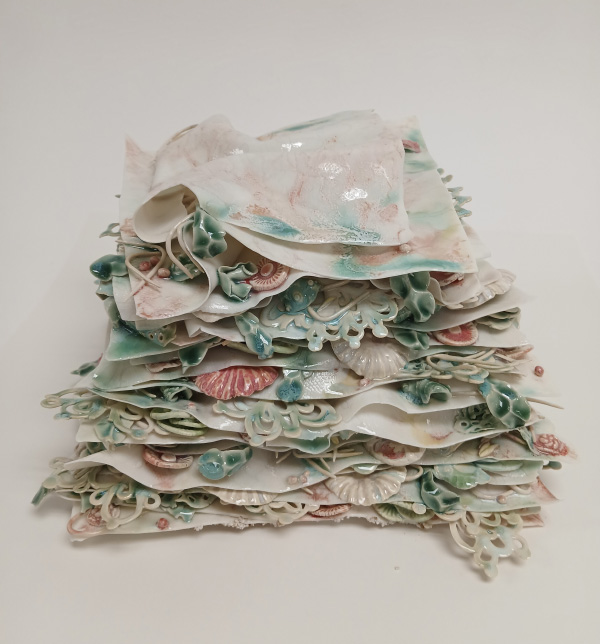
2 ⁄5
Jessica Kreutter
The Weight of Accumulation (detail), 2024
Repurposed elements from past sculptural installations made of porcelain and fused with glaze
Varying heights, approx. 10” x 10” each
Photo courtesy of the artist.
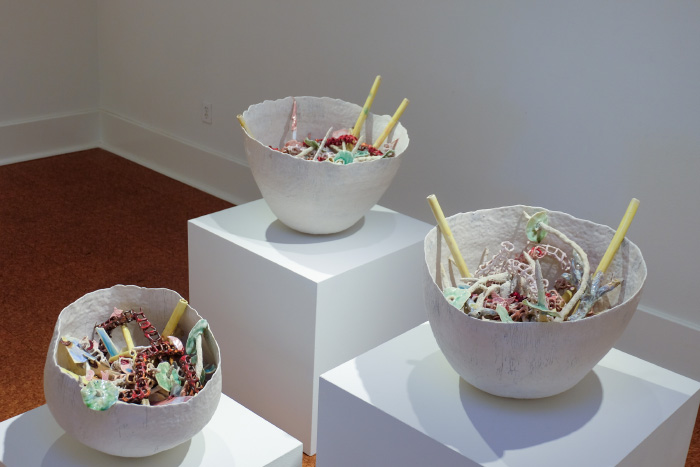
3 ⁄5
Jessica Kreutter
Sanctuaries of rubble
egg, earth, orb, shell, planet, home, 2024
Repurposed elements from past sculptural installations made of ceramic and porcelain and fused with glaze
3 @ Approx. 20” x 18 “ x 18 “ each
Photo courtesy of Roxann Grover.
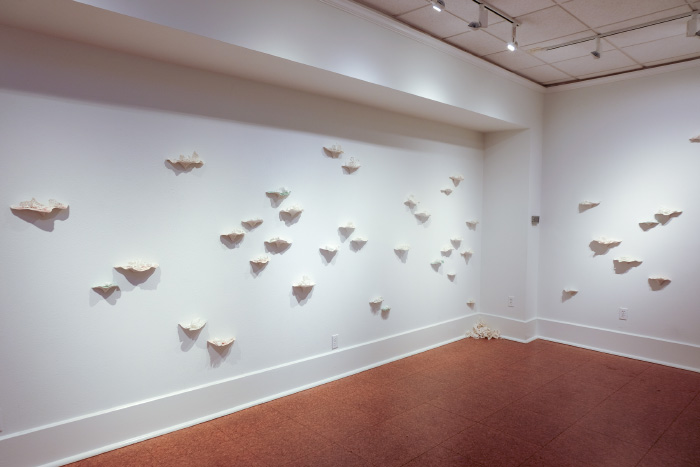
4A ⁄5
Jessica Kreutter
In earth we remain, remains, remember, reform, transform, transcendence, 2024
Repurposed fragments with porcelain, glaze, lusterInstallation dimensions variable, Varying sizes
Photo courtesy of Roxann Grover.
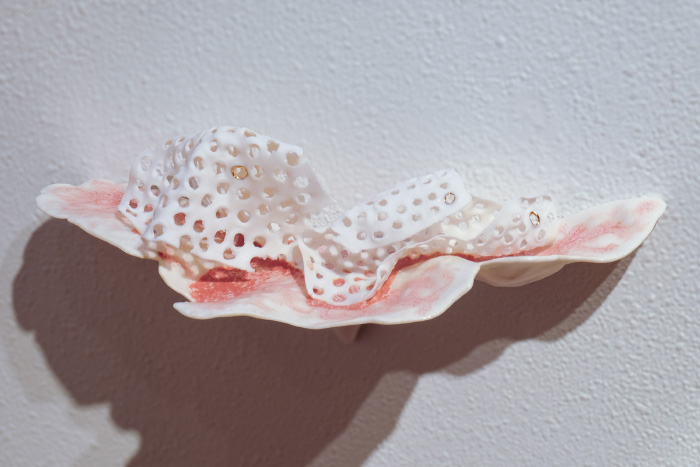
4B ⁄5
Jessica Kreutter
In earth we remain, remains, remember, reform, transform, transcendence (Detail), 2024
Repurposed fragments with porcelain, glaze, luster
Installation dimensions variable, Varying sizes
Photo courtesy of Roxann Grover.
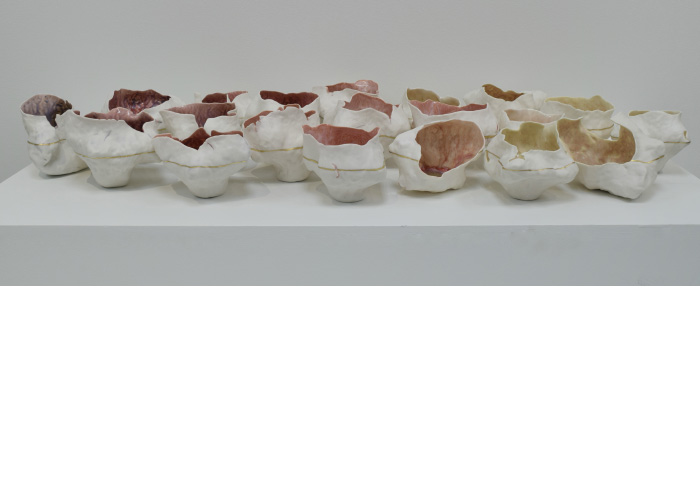
5A ⁄5
Jessica Kreutter
(Each and every) our imperfect hearts, inseparable, broken, healing, 2024
Porcelain, glaze, luster
Varying sizes
Photo courtesy of the artist.
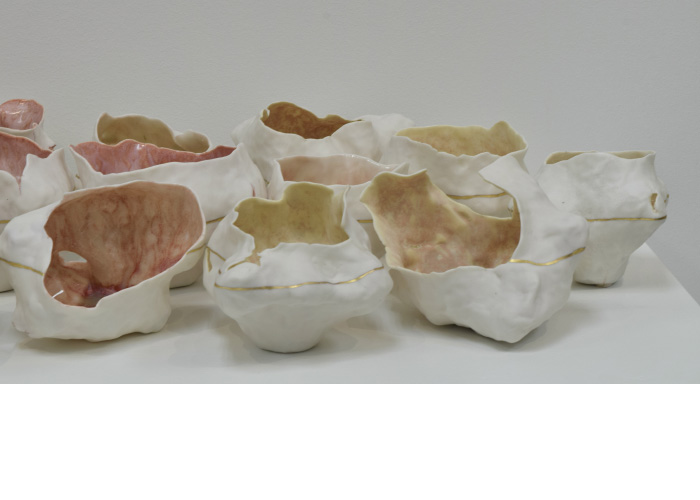
5B ⁄5
Jessica Kreutter
(Each and every) our imperfect hearts, inseparable, broken, healing (Detail), 2024
Porcelain, glaze, luster
Varying sizes
Photo courtesy of the artist.
The Denver-born Kreutter was schooled in Portland and Knoxville, and has served several artist residencies throughout the country, including at the Houston Center for Contemporary Craft. She now teaches ceramics and sculpture full-time at Houston Community College.
“I am interested in creating moments in which worlds and times flow together,” she says. “These moments suggest there is something more than what appears to be: a place between remembering and forgetting, where beauty and repulsion are intertwined. These points where boundaries are dissolved reveal different possibilities for how to imagine the world.”
“The act of making something salvageable from pre-existing parts is a risk,” she says. “The new forms slump, flatten, re-fuse, and topple in firing. The process has been an act of play, experimentation, loss, and change. But letting go of past work lessens the weight of accumulation and brings change. Perhaps it is about breaking what exists to see what else is there. Or one last hurrah before throwing it in the bin. What I’ve tried to do is move through the experiment until I have faith in the process and can forget about the outcome.”
—LINDSEY WILSON

